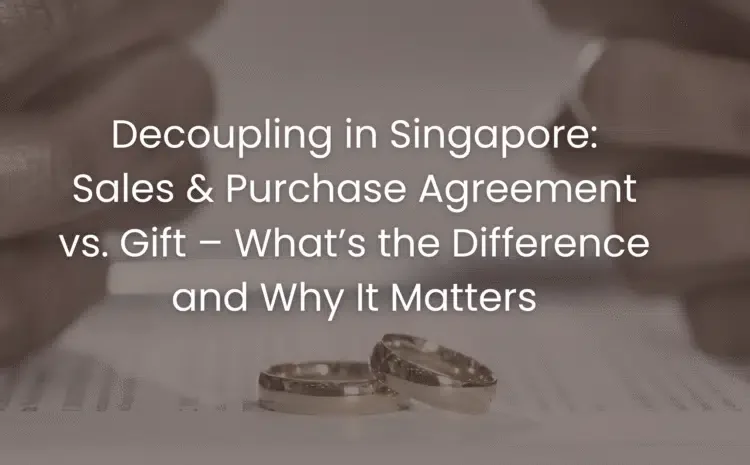Decoupling in Singapore: Sales & Purchase Agreement vs. Gift – What’s the Difference and Why It Matters
When decoupling property in Singapore, homeowners typically transfer ownership through either a Sale & Purchase (S&P) Agreement or a Gift Deed. At first glance, gifting your share to your spouse or co-owner may seem simpler or cheaper—but what many don’t realise is that the legal and CPF consequences are very different.
If you make the wrong choice, you could end up having to refund more CPF than expected, clear the full mortgage loan, or even invalidate the transfer in the eyes of the law.
Let’s break down both options—so you can decide what works best for your decoupling plan.
Option 1: Decoupling via Sale & Purchase (S&P) Agreement
This is the most common and preferred method for decoupling.
An S&P Agreement treats the transfer as a legal sale of one party’s share of the property to the other, even if both are spouses or family members.
Key Features:
Considered a commercial transaction
The selling party receives proceeds (can be CPF, cash, or both)
The buying party pays Buyer’s Stamp Duty (BSD) based on their acquired share
The selling party only refunds the CPF they used, along with accrued interest
No need to fully repay the loan—only the buyer’s financial capacity is reassessed
Ideal for: Couples with uneven CPF contributions, ongoing loans, or structured planning
Learn more about CPF Refunds After Decoupling
Option 2: Decoupling via Gift Deed (Transfer by Way of Gift)
Some property owners explore gifting their share to a co-owner, thinking it may be faster or involve less paperwork.
But decoupling by gift comes with major CPF and loan implications, especially under CPF Board regulations.
What You Must Know:
Treated as a voluntary transfer with no sale proceeds
Because there’s no cash involved, CPF Board requires both owners to refund their CPF in full, including interest
You must also redeem the entire mortgage loan
This can cause serious cash flow or financing issues—especially if the gifted party cannot qualify for a new loan alone
The transfer may also raise valuation and tax questions if IRAS suspects the gift undervalues the property
Unable to sell within 3 years of the Gift as the transaction is considered voidable under Insolvency, Restructuring and Dissolution Act 2018.
Not recommended unless there’s:
No CPF used for the property
No outstanding loan
Clear estate planning reasons that justify the gift
Summary Table: S&P vs. Gift in Decoupling
| Feature | S&P Agreement | Gift Transfer |
|---|---|---|
| CPF Refund | Only selling party refunds their CPF | Both parties must refund CPF in full |
| Loan Impact | Loan restructured or partially redeemed | Entire loan must be cleared |
| Stamp Duty | Buyer pays BSD | Buyer pays BSD (same as S&P) |
| IRAS/Valuation Risk | Low | Higher risk if gift undervalued |
| Legal Structure | Treated as sale | Treated as voluntary transfer |
| Estate Planning Flexibility | Standard | May trigger tax or legal concerns |
| Insolvency, Restructuring and Dissolution Act 2018 Risk | NIL | Unable to sell within 3 years of the Gift as the Gift is considered voidable |
Why Legal Advice Matters in Choosing Between Sale vs. Gift
Your choice between S&P and Gift isn’t just a paperwork preference—it affects your:
CPF obligations
Stamp duties
Home loan structure
Financial readiness
Estate distribution plan (especially for Wills and LPA)
Before you decouple, consult with a property and family lawyer who can run through CPF refund simulations, loan restructuring advice, and ensure your transfer is valid and enforceable.
Visit our Property & Finance Law page or meet our team here.
Not Sure Which Route to Take? We Can Help.
Making the wrong choice between S&P and Gift can derail your decoupling plan. Let us guide you through the pros and cons based on your CPF use, home loan, and long-term goals.
Call or WhatsApp us at +65 8780 2499
DM us on Instagram:@yylee_familylaw
Frequently Asked Questions
-
In most cases, S&P is better as it avoids full CPF refund and loan repayment. Gift transfers are only advisable if there is no loan and CPF was not used.
-
Yes, the receiving party still needs to pay Buyer’s Stamp Duty based on the market value of the share received—even if it’s a gift.
-
Both owners must refund their CPF savings in full, including interest, regardless of who is transferring their share.

